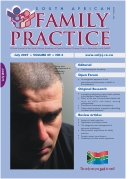Involuntary admission of psychiatric patients in the Northern Cape Province and the accuracy of the initial psychiatric assessment done by referring general practitioners
Abstract
Background Admission to a mental healthcare facility is not always based on the voluntary consent of the patient. Sometimes a patient is unable or unwilling to consent to admission because of his mental status and lack of insight into his mental illness. If a mentally ill person needs admission because of a threat to himself and other people, the law prescribes procedures to admit such a person into an appropriate facility for care, treatment and rehabilitation. Such admissions are called involuntary admissions. Involuntary admissions in a psychiatric hospital have financial, legal and ethical implications. In order to avoid unnecessary involuntary admissions, there is a need to determine and understand the factors causing involuntary admissions. Many previous studies have focused on the differences between patients admitted voluntarily and involuntarily. The goal of this study was to analyse the conditions responsible for the involuntary admission of psychiatric patients in the Northern Cape Province and the accuracy of the initial psychiatric assessment done by the referring general practitioners. Methods This descriptive study included 199 patients admitted to West End Hospital in Kimberley for involuntary treatment during 2003. The data were extracted from clinical records and legal documentation relating to these patients. The patients’ final diagnoses were extracted from the discharge summary and were based on the text revision of the fourth edition of DSM (DSM-IV-TR). Only diagnoses on axis I (clinical disorders and other conditions that may be a focus 1 clinical attention), axis II (personality disorders and mental retardation) and axis III (physical disorder or general medical condition that is present in addition to the mental disorder) were included in this study. Results Most patients were male (65.8%) and the patients’ ages ranged from 16 to 67 years (mean 32 years). Patients were mostly diagnosed with schizophrenia (57.8%), while 26.6% had substance-related disorders. Few patients (5.0%) were diagnosed with mental retardation and personality disorders. A quarter (24.1%) of the patients had a general medical condition. The majority (81.4%) of patients were found “certifiable and 77.4% were known psychiatric patients. Two-thirds of the patients were referred by general practitioners doing session for the state hospitals. The overall accuracy of psychiatric diagnosis by the referring doctors was considered correct if any of the provisional diagnoses listed by the referring (certifying) doctor matched with the final diagnosis at discharge from the hospital. Approximately half (49.5%) of the patients were diagnosed correctly by the referring doctors. Conclusions Schizophrenia and psychoactive substance-related disorders were the most important conditions leading to involuntary care in the Northern Cape. General practitioners play a major role in involuntary admission, but only made correct psychiatric diagnoses in approximately half of the patients.
Published
2007-07-03
Issue
Section
Original Research
By submitting manuscripts to SAFP, authors of original articles are assigning copyright to the South African Academy of Family Physicians. Copyright of review articles are assigned to the Publisher, Medpharm Publications (Pty) Ltd, unless otherwise specified. Authors may use their own work after publication without written permission, provided they acknowledge the original source. Individuals and academic institutions may freely copy and distribute articles published in SAFP for educational and research purposes without obtaining permission.

